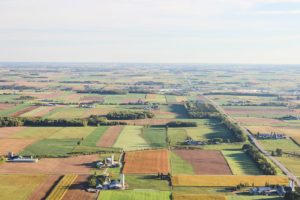According to the Food and Agriculture Organization of the United Nations, it will be necessary to increase agricultural production by 70% by 2050 to be able to feed 9.1 billion people.
The challenge of tomorrow, therefore, has several dimensions: we must produce more to feed more mouths, ensuring a balanced diet for all and more respect for the environment.
This involves agriculture, which consumes less energy (and other energies than oil), less water, and preserves water and soil quality, but the changes will also come from our consumption choices and our behavior.
Limiting food waste
In thezpoorest countries, the majority of losses occur at the time of harvest (15 to 35% loss in the fields) and at the time of manufacture, transport, and storage (10 to 15%);
It is therefore essential to provide resources to the countries of the South to limit losses during the harvest, and in the countries of the North, to adapt our consumption to avoid waste.
 Adopting food choices that have less impact on the planet
Adopting food choices that have less impact on the planet
Each food has a higher or lower environmental impact. Everyone can act at their level to ensure a quality diet that also helps conserve resources.
Above all, it is a question of having the most diversified food possible by applying two main principles:
- consume a variety of fresh, seasonal, locally produced fruits and vegetables that are more environmentally friendly;
- favor legumes at a level recommended by nutritionists.
What place for biofuels?
To reduce greenhouse gas emissions from thermal cars, manufacturers have developed cars running on biofuels. From cultivated plants such as cereals, beets, rapeseed, or sunflower, soybeans, or oil palm, they are an alternative solution to fossil fuels.
In some countries (notably in Latin America), the cultivation of biofuels can compete with food production. It is to avoid this that important research is underway to develop biofuels 2nd generation. The latter comes from, among other things, biomass (wood, straw, etc.), algae, and, more generally, living organisms. They are expected on the market by 2020.
Promote a subsistence, local agriculture
In order to allow equal access to food, experts propose to further develop subsistence farming in developing countries. It is a “self-consumption” agriculture directly linked to food, most of whose production is consumed by the farmer and his family. Only the surplus would be sold on local markets.
It would also reduce greenhouse gas emissions from transporting crops from the country of production to the country of consumption.
